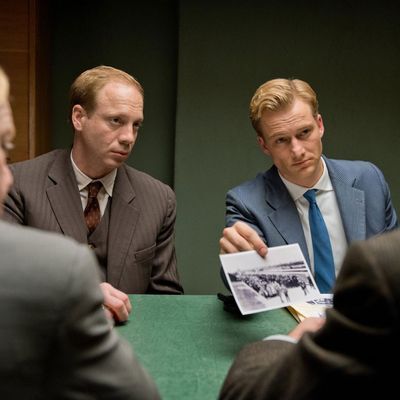
Can a film about the Holocaust actually be ÔÇ£entertainingÔÇØ? Dare we even ask such a question? To be fair, the German film Labyrinth of Lies┬áÔÇö that countryÔÇÖs submission for the Academy Awards this year ÔÇö isnÔÇÖt so much about the Holocaust as it is about the aftermath. But still, the zip and flash with which this legal drama moves feels odd, in light of the historical events that loom over it. HereÔÇÖs a movie about the efforts to bring the soldiers stationed at Auschwitz to justice, and itÔÇÖs strangely light on its feet.┬á
It starts in the late 1950s, with young public prosecutor Johann Radmann (Alexander Fehling) brashly accepting a case involving an Auschwitz guard currently living a quiet life as a schoolteacher. No other lawyer in the office wants to bring charges against the man; in fact, nobody, not even Johann, seems even to know what Auschwitz was. The Americans took all the war records, the Nuremberg trials have long since concluded (and convicted only a small handful of leaders), and thereÔÇÖs a new enemy to fight now: Communism. All of Germany seems to be under a cloud of forgetfulness. ÔÇ£ItÔÇÖs all propaganda,ÔÇØ one person says, when confronted with the facts. ÔÇ£The victors make up stories.ÔÇØ
But Johann ÔÇö youthful and ignorant, but also dogged and righteous ÔÇö starts to learn more about the Holocaust, and about Auschwitz. He starts collecting survivor accounts. He learns the name of Dr. Josef Mengele ÔÇö and, to his shock, discovers that not only do the German authorities know the notorious war criminal is living peacefully in Argentina, but that they even turn a blind eye when he returns home on occasion. And Johann realizes that prosecuting one man isnÔÇÖt enough: There were 8,000 people who worked at the concentration camp, and he considers them all accountable for the hundreds of thousands who died there. No one wants to hear it because there are skeletons in pretty much everyoneÔÇÖs closet. When Johann inquires with an American at the war archive if the schoolteacher heÔÇÖs investigating was a Nazi, the man doesnÔÇÖt even bother to look it up. ÔÇ£He was a Nazi,ÔÇØ the American shrugs. ÔÇ£You were all Nazis.ÔÇØ
As one might expect, JohannÔÇÖs investigations lead him down the darkest of alleys. If the labyrinth of the filmÔÇÖs title refers to the maze of deceptions on which German society in the 1950s and ÔÇÖ60s was built, thereÔÇÖs also a labyrinth of truth to counter it: Johann eventually becomes consumed by his own crusade, and begins to question everything. ÔÇ£Do you want every young German to ask if their father was a murderer?ÔÇØ someone asks him. ÔÇ£Yes, thatÔÇÖs exactly what I want!ÔÇØ is the response.
But again, one wishes that the film, while never frivolous, had found a way to channel that darkness more effectively. There are a couple of powerful moments when survivors relate their stories, but for the most part, JohannÔÇÖs Auschwitz investigations remain at the level of silent montages. When, in an effort to get a servant to help him identify Mengele, he shows her a photo of what they did to children, we donÔÇÖt see the photo. Is it mere ÔÇ£tastefulnessÔÇØ that keeps director Giulio Ricciarelli from showing us whatÔÇÖs in the picture? Or is it a knowledge that the darkness could eventually consume us, too?
But maybe thereÔÇÖs another, more thematically pertinent way to look at the filmÔÇÖs odd airiness. ThereÔÇÖs a new world being built amid the refuse of the old. Johann and his journalist pal Thomas Gnielka (Andr├® Szymanski), who helps spur on his investigation, are surrounded by a generation of carefree young Germans, partying and trying to create a new life for themselves. Johann hooks up with Marlene (Friederike Becht), an enterprising young seamstress who, with a little assist from JohannÔÇÖs own boldness, starts a small fashion business. In one scene, she reads off the instructions on a new sewing machine while he talks about his efforts to arrest Josef Mengele. ItÔÇÖs a telling juxtaposition, and it suggests that the filmÔÇÖs paradoxical style might mirror the conflict at the heart of this society: Where does one draw the line between the horror of the past and the promise of the future?


